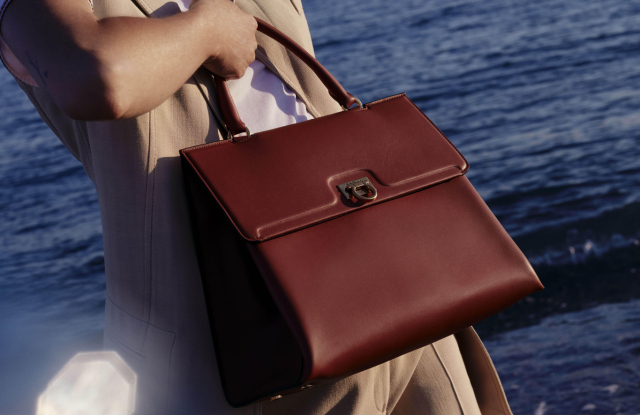COVID-19 Effects Hurt Salvatore Ferragamo’s H1 Top Line – WWD
MILAN — The month of July is showing improvements in all of Salvatore Ferragamo’s markets, but the closure of stores during the coronavirus pandemic hurt the company’s top line in the first half of the year.
The Florence-based luxury group reported preliminary sales on Tuesday at the end of trading, which showed a 46.6 percent drop to 377 million euros in the first six months ended June 30. This compares with 705 million euros in the same period last year.
Sales in the second quarter fell 60.1 percent, impacted by the pandemic, the lockdown of commercial activities and the lack of international traffic.
As of June 30, the company had 643 points of sales, including 389 directly operated stores and 254 third-party-operated stores in the wholesale and travel retail channels.
In the first half, the retail distribution channel reported a 41 percent drop to 260.6 million euros, representing 69.2 percent of the total. In the second quarter, retail revenues decreased 51.2 percent.
Sales in the wholesale channel tumbled 56.4 percent to 110.8 million euros, accounting for 29.4 percent of the total.
In the second quarter, wholesale revenues were down 75.7 percent, mainly penalized by the performance of the travel retail channel and of the fragrances division.
The Asia Pacific area continued to be the group’s largest market in terms of revenues, decreasing by 39.9 percent to 166.7 million euros, accounting for 44.3 percent of the total. In the second quarter, sales in the area were down 35.3 percent at constant exchange rates, benefiting from the positive performance of the retail channel in China, which recorded growth of 11.6 percent at constant exchange rates.
In particular, as of July 25, the group had registered solid growth in directly operated stores in Mainland China, Korea and Japan compared with July last year.
Europe showed a 51.7 percent decrease in revenues in the first half, which fell to 85.7 million euros, accounting for 22.8 percent of the total. Sales in the second quarter were down 71.9 percent at constant exchange rates, strongly penalized by store closures and the lack of tourists in the period.
These factors affected all regions. North America was down 54.4 percent to 69.7 million euros, representing 18.5 percent of the total in the first half, with the second quarter plummeting 81.1 percent.
The Japanese market registered a 37.4 percent decrease in revenues in the first half to 36.8 million euros, accounting for 9.8 percent of the total, with the second quarter reporting a 56.1 percent drop.
Revenues in Central and South America were down 54.6 percent to 17.4 million euros, accounting for 4.6 percent of the total. In the second quarter they dove 89.2 percent.
By product category, sales of shoes, a core business for Ferragamo, were down 46.4 percent to 159.5 million euros, accounting for 42.4 percent of the total.
Revenues of leather goods and handbags fell 43.6 percent to 158.5 million euros, representing 42.1 percent of the total.
Ready-to-wear was down 47.3 percent to 19 million euros, accounting for 5.1 percent of the total.
Fragrances registered a decrease of 66.3 percent to 14 million euros, representing 3.7 percent of the total, also impacted by the performance of the travel retail.
As reported in May, Michele Norsa has returned to Ferragamo, joining the board as director and executive deputy chairman. Ferruccio Ferragamo helms the company as chairman, but passed his executive proxies to Norsa, and Micaela le Divelec Lemmi remains chief executive officer. Norsa first joined Ferragamo in 2006 and helped it expand globally, publicly listing it in 2011 in his role as ceo, and exiting in 2016.
Ferragamo launched a new web site during the lockdown in Italy at the end of April, as part of the company’s recent increased drive into technology and social media. The company unveiled a video during Milan Digital Fashion Week earlier this month about the values of the brand, and in July introduced the Augmented Store 360, a virtual tour of its boutiques, compatible with AR devices, and which allows consumers to buy online and visit the Ferragamo Museum in Florence, including an interactive tour led by personal guides.
Separately, earlier on Tuesday, organizers of the Venice Film Festival confirmed that the event will go on as scheduled in a physical format, running Sept. 2 to 12, and Luca Guadagnino’s feature-length documentary on founder Salvatore Ferragamo will be presented in the Out of Competition section.
Guadagnino’s documentary traces Ferragamo’s artistic journey, while also exploring the history of Italy and America, the latter the country where he first developed his business, creating shoes for the likes of Marilyn Monroe and Audrey Hepburn. The film relates Ferragamo’s path, starting his career as an apprentice shoemaker in Naples and then becoming the owner of the Hollywood Boot Shop in California, to his return to Italy, founding his namesake company in Florence.
The film, said the Festival’s artistic director Alberto Barbera, is “fascinating, disruptive and perfectly accomplished.”
“We were overjoyed to learn that the film about my father’s life would be presented at the Venice Film Festival,” said Ferruccio Ferragamo, Salvatore’s son. “It is an honor for me and my entire family that a director of Luca Guadagnino’s caliber would take an interest in our family history, adapting it for the big screen.”
Ferragamo’s autobiography inspired Guadagnino to develop the project starting in 2017, reaching out to the Ferragamo family. The director had access to the fashion brand’s archives, family anecdotes and interviews, including with the late Wanda Miletti, Salvatore’s wife, who died in October 2018.
For three years, Fondazione Salvatore Ferragamo and Museo Salvatore Ferragamo worked with the director and screenwriter Dana Thomas. Research was also based on the tape recordings of Salvatore Ferragamo reading aloud some of the chapters of his autobiography, which were restored for the occasion, and the radio interviews he gave in Australia. In a teaser, Martin Scorsese says that Ferragamo, born in 1898 in Bonito, in Italy’s Campania region, moved to Naples, which at the time in “itself was another galaxy.”
“That has been my life’s work: striving to learn to make shoes that always fit and the refusal to put my name to any that do not fit,” writes Ferragamo in the preface to his autobiography. “Therefore please look behind the story of the small, barefoot, unlettered boy who became a famous shoemaker, and seek the pleasure you will obtain from walking well.”
Guadagnino, whose movie “Call Me By Your Name” received an Oscar nomination for Best Picture and one for Best Actor in a Leading Role for Timothée Chalamet’s interpretation, in 2012 founded the production company Frenesy Film specifically for taking on projects with major fashion brands, and he has directed or produced short films or commercials for, among others Fendi, Giorgio Armani, Ermenegildo Zegna, Salvatore Ferragamo, Sergio Rossi, Cartier, Pomellato and Valentino.


